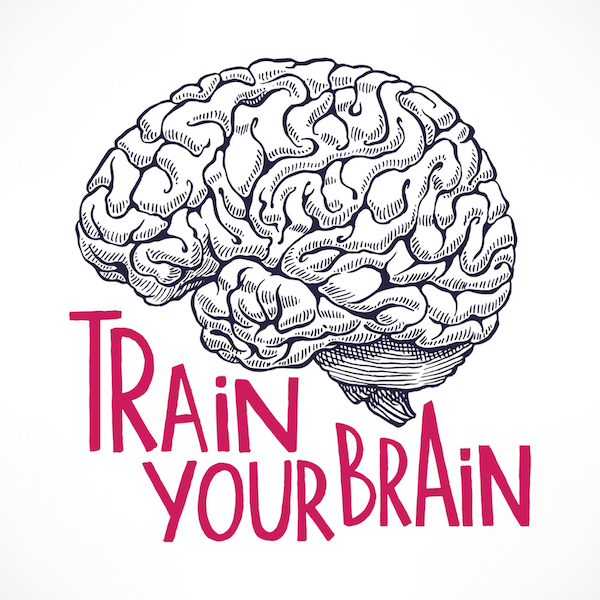8 Proven Ways to Keep Your Mind Sharp and Active

When I was in my mid-20s, just starting out at a small publishing company, I was embarrassingly proud of my ability to multitask.
Not only could I crank out an 800-word essay on regional dining trends in under an hour, I could simultaneously carry on a conversation with coworkers, make a pot of coffee, and jot down notes for afternoon meetings.
This made me (I thought) not only a valuable employee, but also mentally acute. I was exercising my brain countless ways simultaneously.
Turns out I was just naïve. That Swiss army knife approach to task completion has been poo-pooed by scientists and medical professionals alike. Multitasking is not a thing our brains are good at, and nobody has a “gift” for it.
Worse yet, it encourages a habit of perpetual distraction. Stanford Researcher Anthony Wagner put it this way: “When [we’re] in situations where there are multiple sources of information coming from the external world or emerging out of memory, [we’re] not able to filter out what’s not relevant to [our] current goal. That failure to filter means [we’re] slowed down by irrelevant information.”
MIT Neuroscientist Earl Miller digs a little deeper:
When we toggle between tasks, the process often feels seamless—but in reality, it requires a series of small shifts. Say you stop writing a pitch for a client in order to check an incoming email—when you finally return to the pitch, your brain has to expend valuable mental energy refocusing on the task, backtracking, and fixing errors. Not only does this waste time, it decreases your ability to be creative. Innovative thinking, after all, comes from extended concentration, i.e. the ability to follow an idea of thought down a network of new paths. When you try to multitask, you typically don’t get far enough down any road to stumble upon something original because you’re constantly switching and backtracking.
It turns out my multitasking wasn’t making me smarter—it was making me a bad juggler of mostly irrelevant information. And yes, my daily pots of coffee suffered because of it.
Okay, you say, but we’ve all heard that multitasking is bad for us. The bigger question is: What can we do to keep ourselves mentally sharp for as long as possible (despite our multitasking tendencies)?
As ETR Editor Craig Ballantyne has long taught, you need to focus on one thing at a time. Much like the Morning Routine approach of tackling one goal at a time, exercising your mind is an act of singular discipline.
So stop pretending that mental juggling will keep you sharp as a tack until you’re 90. Try these activities instead:
- Keep learning (new skills). That’s broad, of course, but be sure that whatever you learn has application. The process of learning and applying new information stimulates brain cells and encourages communication across the various parts of the brain. Oh, and pick something that’s genuinely outside your current knowledge base. If you’re a computer tech whiz, try learning a new language instead of teaching yourself new software. I.e., pick a challenge—not an easy “A.”
- Strengthen memory and recall by using all of your senses. Learning or experiencing something new using just one sense is great, but is more impactful when paired with other senses. If you’re learning a new language, for instance, make sure you incorporate audio lessons into your textbook study. If you’re teaching yourself about wine, make sure that you absorb both the flavor and the smell. The alignment of these two in your mind improves recall and cements the relationship of new information.
- Save your mental processing power for what matters. Don’t spend so much energy trying to remember everything—like what to buy at the store, how to use the new remote to turn on the stereo, or what your coworker’s address is. Write it down. Save your mental energy for remembering and applying more useful things, like how to make that pot roast you recently learned in a cooking class.
- Repeat what’s important. If you want to remember something, say it back to yourself (or write it down) as soon as you’ve heard it. This small action will help cement that piece of information in longterm memory.
- Be social. Positive social relationships are key to mental acuity, as they force the mind to process different perspectives without the added stress of external expectations. Also, relationships offer relief from grief and stress, which are known to have a toxic effect on the brain. And, if you find new social environments—say, through volunteerism—you can grow your understanding of others’ life circumstances, building empathy.
- Sleep. This is a given, right? But how many times have you heard someone “jokingly” quip, “I’ll sleep when I’m dead”? In today’s harried culture, that’s no joke—and the brain suffers because of it. A strong 7-8 hours of sleep every night gives your mind the chance to clean up toxins, solidify memories, and process experiences that rushed by us during the day.
- Exercise. You’ve heard this a million times, but that’s because it’s true. Recent studies have shown that beyond its clear physical benefits, exercise increases secretion of neuroprotective factors in the brain (which help prevent stroke and brain disease).
- Quit smoking, avoid heavy drinking, and refrain from impact sports. Smoking thins the brain’s very importance cortex, binge drinking can shrink the brain’s frontal lobe over time, and impact sports can directly (and irreversibly) damage brain matter. Avoid these activities. (Kind of a no-brainer, right?)
All of these give you a springboard for great mental maintenance, but there’s something else that should be noted:
Whatever you choose to focus on, follow through. If there’s one thing I’ve been guilty of in my adult life, it’s hopping from project to project without crossing all my Ts and dotting my Is. I become easily discouraged by negative feedback or distracted by other projects that seem more exciting. But the downside is clear: My brain doesn’t have the chance to work through the completion of a task, leaving much of its processing power unused. What’s more, I don’t have the chance to celebrate my “wins” because I don’t make it to the finish line.
There’s also this pesky psychological principle known as the Zeigarnik Effect, which claims that our minds get stuck on uncompleted tasks—and unresolved relationships. Those tasks and relationships take up valuable memory and mental energy that should be applied to new experiences.
So spend your mental energy on the right things. And for more information on maintaining cognitive acuity, read this insightful article from Psychology Professor Lisa Barrett of Northeastern University. It’s a deep look at the “superager” population and what you can do to keep memory strong until the bell tolls.
P.S. If you think your daily Sudoku games and brain puzzles are key to keeping you at the top of your mental game, I have some bad news for you. They probably aren’t. Turns out they’re just not demanding enough to do much for your gray matter. You can read more about that here.
Build the focus and discipline you need for mental and physical success!
Sign up now to get our FREE Morning Routine guide—the #1 way to increase productivity, energy, and focus for profitable days. Used by thousands of fitness, business, and finance industry leaders to leapfrog the competition while making time for the people who really matter. Learn more here.
